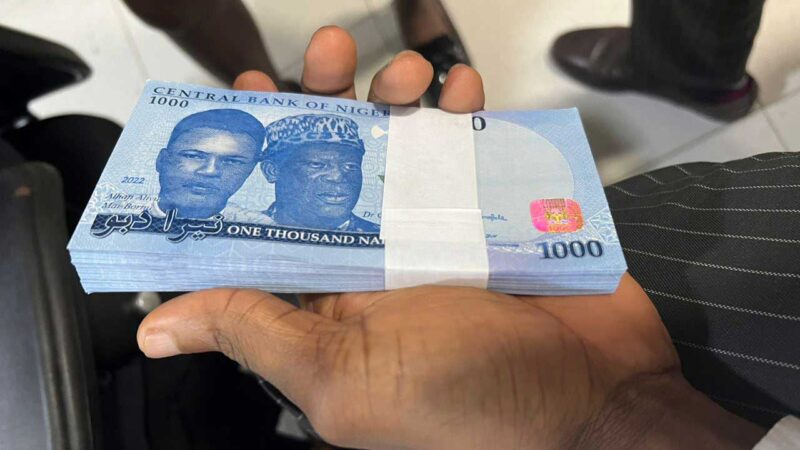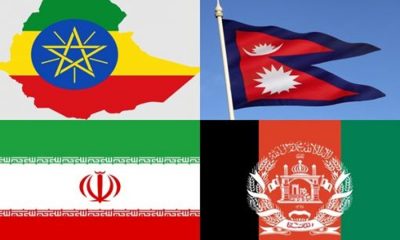News
Parents Fume Over El-Rufai’s Reasons For Withdrawing Son From Public School

Some parents whose children attend the Kaduna Capital School in the Malali area of the metropolis have reacted to Governor Nasir el-Rufai’s reasons for withdrawing his son from the school, saying the governor erred by not sharing the security threat with the school and parents.
Last year, the governor dramatically enrolled his son in one of northern Nigeria’s oldest public schools.
Muyiwa Adekeye, the special adviser on media and communication to the governor, had remained mum when an explanation on the governor’s action was sought for.
However, in an interview with BBC Pidgin, after publication of the story, El-Rufai said his son had been targeted by bandits because of his public stance against the payment of ransom.
In the interview, El-Rufai said it was the first time he would address the issue. He added that his daughter, Nesrin, was also enrolled in the school when she turned six.
He said although there was no threat to Nesrin, both children were removed from the school on the advice of security agencies.
“My son and my daughter were registered in the school because his sister became six and we had to register her.
“But we have had to temporarily withdraw them for the security of the school because we got intercepts from at least two groups that are planning to attack the school to kidnap my son.
“I don’t think they will succeed because there will be enough security there to prevent it, but other children may be placed in danger.
“We have no idea what weapons they will come with. I have taken a stand against paying bandits and at least three groups of bandits have been intercepted planning to go to the Kaduna Capital School and kidnap my son and ‘see if they catch my son, I go say I no go pay ransom?’” the governor said.
He assured that his decision was purely based on the safety of other children in the school, adding that he had enrolled his son in the school to prove to the people of Kaduna State that he had enough confidence in the public school system, and stressed that he intended to keep the promise.
However, some parents whose children still attend the school yesterday expressed disappointment at the governor’s action, saying he had portrayed his son as more important than other children in the school.
Reacting to the governor’s BBC Pidgin interview, Alhaji Badamasi Ibrahim, whose children attend Kaduna Capital School, said he was left with no choice but to either withdraw his children from the school or temporarily suspend their attendance now that he knows the school is a target.
“Honestly, I am in a dilemma because now that the governor has removed his son from the school, it means the other children are not safe. Should we also withdraw our children? Who will protect them?” He asked.
Alhaji Ibrahim further said he was excited when the governor enrolled his son in the school in 2019, adding, “I was so sure that the quality of education would improve, knowing that the governor would want the best for his son. But knowing that the boy no longer attends the school and hearing the governor’s reasons is demoralising.”
A female parent who asked to remain anonymous, however, commended El-Rufai’s boldness, saying his son’s presence may have put other children at risk.
She said, “The boy continued to attend the school until the threat came, so I think he did the right thing. His son’s presence is likely to put others at risk. Imagine the resources that go into protecting one boy in such a school?”
With the governor’s explanation, parents whose children were abducted in higher institutions within the state said his action brought back painful memories of the plight of their children.
One of such parents, who acted as the chairman of the parents of abducted students of the Federal College Forestry Mechanisation, Afaka, Abdullahi Usman, said the governor’s action showed his inability to protect his son, and therefore, cannot protect anyone else.
“As the chief security officer of the state, this means he cannot protect his own child’s school, how then can he protect other children. This means the government has failed in protecting the schools in the state,” he said.
News
Currency in circulation now N4.8tn – CBN report

Currency in circulation now N4.8tn – CBN report
Currency in circulation has reached an all-time high of N4.8 trillion as of November 2024, recording over seven per cent increase from the previous month.
Also, currency outside banks grew significantly in the same month hitting an all-time high of N4.6 trillion from the N4.2 trillion in the month of October.
These figures were contained in the money and credit supply data from the Central Bank of Nigeria (CBN).
The currency in circulation is the amount of cash–in the form of paper notes or coins–within a country that is physically used to conduct transactions between consumers and businesses.
It represents the money that has been issued by the country’s monetary authority, minus cash that has been removed from the system.
Similarly, currency outside a bank refers to cash held by individuals, businesses and other entities that is not stored in banks.
The currency outside the bank represents about 96 per cent of the currency in circulation.
Nigerians have in recent times been facing acute cash shortage with banks limiting daily withdrawal at Automated Teller Machines (ATMs) to N20,000 irrespective of the number of accounts held by an account owner.
READ ALSO:
- Cross River man kills mother, dumps body inside well
- El-Rufai mocks Reno Omokri with throwback protest photos against Tinubu
- Warri refinery: Marketers hopeful of further petrol price drop
According to the latest data, the currency in circulation grew by seven per cent to reach 4,878,125.22 from 4,549,217.51 in October.
Currency in circulation has grown steadily in the outgoing year 2024 with over one trillion naira added to cash in circulation after starting the year with N3.65 trillion in January.
In February, the currency in circulation slightly increased to N3.69 trillion representing an increase of N43 billion or 1.18 per cent from the January figure.
March also saw an appreciable increase to N3.87 trillion while it further increased to N3.92 trillion in the following month of April.
The growth trajectory continued in May with the currency in circulation increasing slightly to N3.97 trillion, an increase of N42 billion or 1.07 per cent while it reached an all-time high of 4.04 trillion, an increase of 2.11 per cent from May.
The July figure also rose marginally with the currency in circulation settling for N4.05 trillion before growing to N4.14 trillion in August and N4.43 trillion in September and N4.5 trillion in October.
In the same vein, currency outside banks grew from N4.2 trillion in October to N4.6 trillion in November, showing increasing preference for other means of storing outside bank deposits.
Economist, Dr. Paul Alaje attributed the development to the expanding money supply, adding, “Money supply is expanding but this may not necessarily be in cash. As it is expanding, it will necessarily induce inflation. But you can’t blame the people. People must look for money. How much was bottled water last year, how much is it today? All of this will induce inflation. If you now ask, what is the cause of inflation? Is it money supply itself or a devaluation policy? It is a devaluation policy. Money supply is an offshoot. So the Central Bank is raising interest rates to actually reduce money supply but the more they try the more money supply expands.”
He stated that the floatation policy of the CBN has created inflation, adding, “It is like chasing one’s tail and I don’t know if you are going to catch it.”
Currency in circulation now N4.8tn – CBN report
News
Tinubu not telling Nigerians the truth, says Sule Lamido

Tinubu not telling Nigerians the truth, says Sule Lamido
President Bola Tinubu has been accused of not being forthright about the true state of Nigeria under his administration.
Former Jigawa State Governor and senior Peoples Democratic Party (PDP) member, Sule Lamido, made the accusation while speaking on the BBC Hausa programme Gane Mini Hanya.
Lamido criticized both Tinubu and former President Muhammadu Buhari for what he described as a lack of transparency in governance.
“Buhari’s and Tinubu’s governments are not being transparent with Nigerians unlike during the time when PDP was in power where everything was transparent and open to all Nigerians,” Lamido said.
READ ALSO:
- Odili: Fubara prevented Wike from turning Rivers to private estate
- Putin apologises over Azerbaijan plane crash reportedly shot down
- 256 terrorists, two logistics suppliers arrested in one week – DHQ
He accused the two administrations of relying on propaganda rather than providing citizens with accurate information.
Lamido also expressed concerns over President Tinubu’s recent loan requests, questioning the logic behind them. “If Nigerians are being told the truth then there is nothing wrong with that, but how would you budget N30tn, generate N50tn and then request loan when you have a surplus of N20tn,” he said, referencing last year’s budget.
He described the situation as “reckless” and “selfish,” adding, “This recklessness and clear-cut selfishness is not done anywhere in the world, but yet you find (some) Nigerians supporting it. Visit social media and see how APC is being criticised, being referred to as calamity, yet you find some protecting it.”
Tinubu not telling Nigerians the truth, says Sule Lamido
News
Nigeria Customs Service begins 2025 recruitment [How to apply]

Nigeria Customs Service begins 2025 recruitment [How to apply]
The Nigeria Customs Service (NCS) has announced the commencement of its recruitment exercise, assuring Nigerians that the process is entirely free and fair.
The agency has cautioned the public to be vigilant against scammers who may attempt to exploit unsuspecting applicants during the recruitment period.
Applications are invited for positions in the Superintendent, Inspector, and Customs Assistant cadres as part of the Service’s plan to recruit 3,927 officers in 2025.
This initiative is aimed at enhancing trade facilitation and supporting Nigeria’s economic recovery efforts.
“Our recruitment is entirely free and fair. At no stage do we charge fees. Anyone requesting payment is a scammer,” the agency emphasized, urging applicants to be wary of fraudulent schemes.
READ ALSO:
- Dangote, Tinubu, Lookman, Badenoch named among 100 most influential Africans in 2024
- Heavy security in Ilesa as ex-Osun deputy gov emerges new Owa-Obokun
- Hacker has stolen N180m from my NGO account – VeryDarkMan cries out
The NCS outlined eligibility criteria, stating that applicants must be Nigerian citizens by birth, possess a valid National Identification Number (NIN), and have no criminal record or ongoing investigations.
Academic qualifications for the three cadres are as follows:
Superintendent Cadre: A university degree or Higher National Diploma (HND) along with an NYSC discharge or exemption certificate.
Inspectorate Cadre: A National Diploma (ND) or Nigeria Certificate in Education (NCE) from an accredited institution.
Customs Assistant Cadre: At least an O’Level certificate (WAEC or NECO).
In addition to these qualifications, the NCS stressed that all applicants must be physically and mentally fit, providing evidence of medical fitness from a recognized government hospital.
Nigeria Customs Service begins 2025 recruitment [How to apply]
-

 metro3 days ago
metro3 days agoFarotimi to pursue disbarment over arrest, defamation allegations
-

 Business2 days ago
Business2 days agoReal reason Dangote, NNPC drop petrol price — IPMAN
-

 Sports1 day ago
Sports1 day agoAnthony Joshua prostrates before Governor Abiodun during Ogun visit
-

 Health2 days ago
Health2 days agoABU Teaching Hospital will begin kidney transplant in 2025 – CMD
-

 metro1 day ago
metro1 day agoWanted terrorist commander, Bello Turji, a dead man walking – DHQ
-

 metro3 days ago
metro3 days agoNigerian govt urged to intervene in Mozambique post-election violence
-

 metro1 day ago
metro1 day agoFour countries that won’t celebrate New Year
-

 metro1 day ago
metro1 day agoN180m not missing from my account, it was all a plan – Verydarkman

